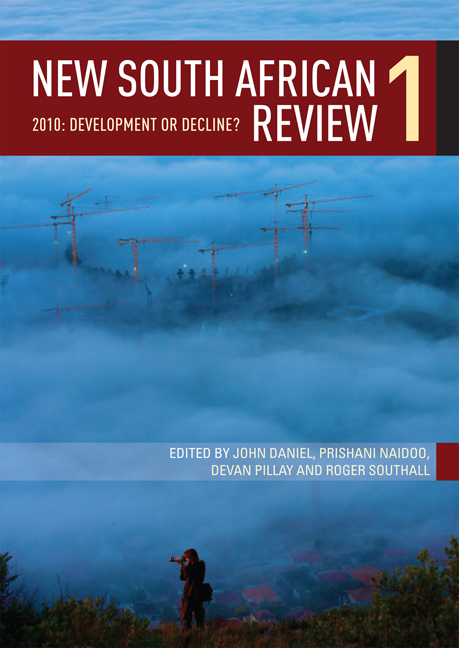Book contents
- Frontmatter
- Contents
- Preface
- Introduction South Africa 2010: From short-term success to long-term decline?
- PART 1 ECONOMY, ECOLOGY AND SUSTAINABILITY
- PART 2 STATE, POLITICS AND POLICY
- PART 3 EDUCATION, HEALTH AND LAND
- INTRODUCTION Reform and redress in higher education, health and land
- CHAPTER 11 ‘Silencing and worse …‘: The humanities and social sciences in South Africa
- CHAPTER 12 Realising transformation, equity and social justice in higher education
- CHAPTER 13 The polarising impact of South Africa's AIDS epidemic
- CHAPTER 14 Health for all? Towards a national health service in South Africa
- CHAPTER 15 The Comprehensive Rural Development Programme (CRDP): A beacon of growth for rural South Africa?
- CHAPTER 16 Breaking down barriers: Policy gaps and new options in South African land reform
- PART 4 Doreen Atkinson
- Contributors
- Index
CHAPTER 11 - ‘Silencing and worse …‘: The humanities and social sciences in South Africa
from PART 3 - EDUCATION, HEALTH AND LAND
Published online by Cambridge University Press: 21 April 2018
- Frontmatter
- Contents
- Preface
- Introduction South Africa 2010: From short-term success to long-term decline?
- PART 1 ECONOMY, ECOLOGY AND SUSTAINABILITY
- PART 2 STATE, POLITICS AND POLICY
- PART 3 EDUCATION, HEALTH AND LAND
- INTRODUCTION Reform and redress in higher education, health and land
- CHAPTER 11 ‘Silencing and worse …‘: The humanities and social sciences in South Africa
- CHAPTER 12 Realising transformation, equity and social justice in higher education
- CHAPTER 13 The polarising impact of South Africa's AIDS epidemic
- CHAPTER 14 Health for all? Towards a national health service in South Africa
- CHAPTER 15 The Comprehensive Rural Development Programme (CRDP): A beacon of growth for rural South Africa?
- CHAPTER 16 Breaking down barriers: Policy gaps and new options in South African land reform
- PART 4 Doreen Atkinson
- Contributors
- Index
Summary
This chapter – a mix of report and analysis – aims to convey that the ‘New South Africa’ is not what it once promised. South Africa's experience of change adds force to Max Weber's claim that revolutionary ideas are invariably ‘disciplined’ by social and political processes. (Abromeit 1994: 27). However, if the rationality which was first projected upon social science by Weber was even-handed, then the sense of loss experienced throughout the humanities in South Africa would be explainable, even perhaps tolerable. But policy in post-apartheid South Africa is increasingly determined by ‘experts’, few of whom are trained in the humanities, and by a technical language upon which their decisions rest. This has dealt a double blow to the humanities. Their commanding position within the academy has been supplanted by the rise of new ways of both knowing and explaining, and their role in freeing South Africa has been entirely ignored.
The facts and figures in this chapter on the status of the humanities and the social sciences in South Africa cannot be divorced from the profound social and political processes which have completely changed the country but, oddly enough, left many things in place. The necessity of bringing South African society back in line follows upon the near-revolutionary moment which the country had reached in the late-1980s. At that time, the revolt against apartheid was embedded within ideas and interpretations which had to be filtered by, amongst other influences, those of the Cold War. Through this lens, local demands for basic human rights took on a distinct insurrectionary tone which generated anti-enlightenment demands, such as ‘no education without liberation’, which now seem to have been completely counterproductive. In negotiating this world, the humanities played an enormous role, at times by causing the political sphere to pause, but mostly by creating a language of both struggle and emancipation which helped South Africans to see a world which lay beyond colonialism, apartheid and, indeed, the Cold War. Without understanding this, there is no appreciating the circumstances in which the humanities and social sciences currently find themselves.
And so to a central argument: What has happened to the humanities in South Africa mirrors a global trend.
- Type
- Chapter
- Information
- New South African Review2010: Development or Decline?, pp. 261 - 280Publisher: Wits University PressPrint publication year: 2010

